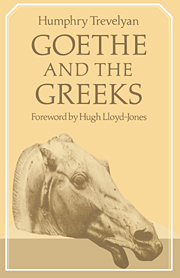CHAPTER VI - LAST YEARS: 1805–1832
Published online by Cambridge University Press: 15 December 2009
Summary
Wir sind vielleicht zu antik gewesen;
Nun wollen wir es moderner lesen.
In 1805, when he wrote his tribute to Winckelmann and said farewell to Hellenism, Goethe was fifty-five. Two-thirds of his life were gone, yet he had only just completed his “Lehrjahre”. His struggle to master the Greek genius was the last great formative error of his life. When that stage was finished, his development too was done. Every potentiality of his nature had now unfolded itself and grown to its full stature. So long as he had still been developing, that aspect of his nature which was at any time growing most actively, tyrannised over his judgment and forced it to praise and condemn, accept and reject, in accordance with the needs of the active member. This was especially the case in his Hellenistic period. He measured all human achievement, and art above all, by Greek standards, and classed as worthless, or at best as of far inferior value, all art that was not founded on the Greek tradition. Now at last, his growing-pains over, he was ready to view the world without passion or predilection, and to find good in every creative influence. An extraordinary catholicity of interest is the most significant characteristic of the last twenty-five years of Goethe's life. Everything that lived and moved in the world around him attracted his attention, so that at times he was overwhelmed by the host of impressions, artistic, political, scientific, and religious, that poured in on him.
- Type
- Chapter
- Information
- Goethe and the Greeks , pp. 263 - 284Publisher: Cambridge University PressPrint publication year: 1981



